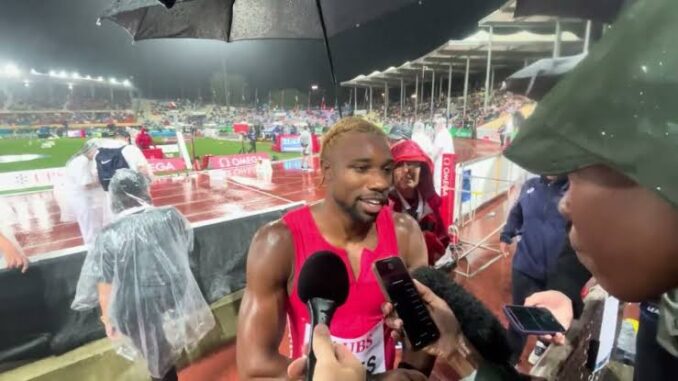
The Lausanne Diamond League once again delivered a thrilling men’s 100m showdown, but this time it was Oblique Seville of Jamaica who claimed the spotlight with an emphatic victory. Seville, who has consistently shown himself as one of the rising forces in global sprinting, executed a near-flawless race to upset American sprint king Noah Lyles. Lyles, fresh off his Olympic and World Championship successes, entered the race as the favorite but finished second, later pointing to his poor start as the decisive factor behind his loss.
Lyles is known for his blazing top-end speed and his unmatched ability to finish strongly, particularly in the 200m. However, in the 100m dash, every millisecond counts, and a sluggish reaction out of the blocks can be the difference between victory and defeat. In Lausanne, Seville reacted quickly to the gun, powering into his drive phase with sharp mechanics, while Lyles was visibly late leaving the blocks. By the time Lyles began to build momentum and hit his stride, Seville had already established an unassailable lead.
Speaking after the race, Lyles admitted, “The start just wasn’t there today. In the 100m, you don’t have time to make up that kind of mistake, especially against someone like Seville. Once I got going, I felt good, but it was too late.” His words echoed the reality of sprinting’s brutal margins—fractions of a second separate winners from losers.
For Seville, this victory was not just about beating Lyles; it was a statement to the sprinting world. The Jamaican has been touted as the heir to Usain Bolt’s sprinting legacy, and though that comparison weighs heavily, his recent performances suggest he is ready to embrace the pressure. In Lausanne, his crisp execution, discipline in transition, and ability to hold form under pressure demonstrated the qualities of a sprinter who is maturing into a world-class contender.
The result also adds another layer to the growing narrative of rivalry between the United States and Jamaica in men’s sprinting. While Lyles has dominated the global stage in recent years, Jamaican sprinters like Seville and Kishane Thompson have begun to close the gap, signaling a resurgence for a nation once synonymous with sprinting excellence. Seville’s win not only boosts his confidence heading into the remainder of the season but also ignites anticipation for future clashes between him and Lyles.
For Lyles, the defeat is both a lesson and a motivator. Though disappointed with his performance, he remained optimistic, noting that the Diamond League is about sharpening form ahead of major championships. His ability to rebound from setbacks has defined his career, and this race serves as a reminder that even the best can stumble in the details. With adjustments to his start and continued refinement, Lyles remains a formidable force.
The Lausanne race may not determine championship medals, but it provides insight into the shifting dynamics of men’s sprinting. Seville’s victory underscores the importance of precision in every phase of the race, while Lyles’ loss highlights the unforgiving nature of the 100m. As the season progresses, fans can expect more electrifying duels between these two stars, each determined to prove their supremacy on the global stage.
In the end, Seville’s triumph was a showcase of preparation and execution, while Lyles’ reflection on his bad start reveals the thin margins that separate glory from defeat in sprinting’s blue-riband event. The rivalry is far from over—if anything, it is just heating up.
Be the first to comment